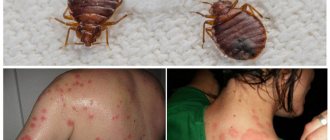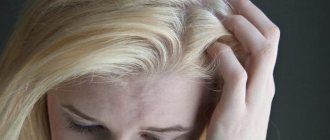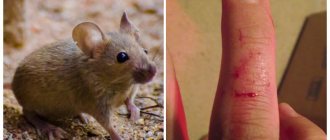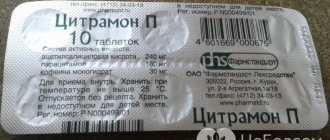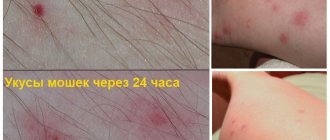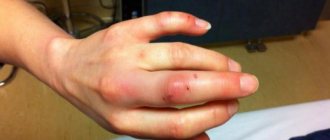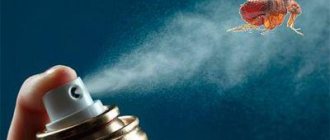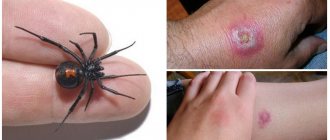The special structure of the piercing-sucking apparatus, which consists of a pair of jaws, helps them bite through the skin. Externally, the pest's mouth is a pointed tube. Due to the structural features of the apparatus, the bug, rather, does not bite the victim’s skin, but pierces it in order to quickly reach small blood vessels with its proboscis.
Insects also have a special “intuition” that allows them to quickly find suitable capillaries due to the ability to detect blood pulsation.
But usually ordinary people do not need such details. They are more interested in what to do if they are bitten by a bug. Experts note that in order to provide better first aid, it is necessary to understand the mechanism of damage to the victim’s blood vessels.
Why do bedbugs not bite all people?
So, the myth that bedbugs do not bite all people in the family is widespread, but fundamentally wrong.
Parasites bite everyone, regardless of blood type, gender, dietary habits, use of personal hygiene products and a number of many other factors.
As for the misconception that bedbugs bite selectively, the following facts are the prerequisites for the emergence of such a myth::
- Bedbugs, as well as other parasites, sense blood circulation; therefore, people with thin skin are often attacked by parasites. Since representatives of the stronger sex have dense skin, it is believed that bedbugs do not bite men. From this we can draw the following conclusion: of two people sleeping together, the one with sensitive skin will be subject to a massive attack of parasites.
- Insect bites are more common in children. This can also be explained by the vulnerable and thin skin of children, increased blood flow in the child’s body. In addition, children throw off the blanket in their sleep, which provides access to the skin for parasites.
- The presence of thick clothing and thick hair, which some representatives of the stronger half of humanity possess, also prevent the attack of bedbugs. Thus, we can conclude that children and women are indeed bitten by bedbugs somewhat more often.
- According to statistics, only three out of ten people have sensitive skin that is prone to redness, swelling and other signs of bedbug bites. Even if parasites bite all family members, traces of the insect attack will remain only on those who have delicate skin.
We should also not forget that bedbugs bite people only in the dark, and the peak of attacks by parasites occurs between three and five o’clock in the morning. Accordingly, lovers of daytime sleep are extremely rarely attacked by insects.
What blood type do bedbugs bite and can they only bite one person in a family?
Many of those who are faced with the problem of bedbugs in their apartments think that they do not bite all the people in the room, but only some. However, it is not. If you get the impression that someone in the family has been bitten by bedbugs, but someone else has not, this is explained by the fact that some people have traces of insect bites on their bodies, while others do not. At the same time, we can say with confidence that bedbugs attacked everyone with the same frequency.
There are quite a lot of misconceptions among people regarding the behavior of bedbugs and their, so to speak, tastes. We regularly receive questions, formulated differently, but almost identical in meaning. For example, people ask:
- “Why don’t bedbugs attack all family members?” Accordingly, a person believes that insects touch only a select few, and wants to know the reason for their choice;
- “Why do bedbugs not bite all people indoors?” On this question it is also clear that the selectivity of insects is an indisputable fact for the questioner;
- “Does it happen that bedbugs only bite one person in the house?” Apparently someone was clearly tormented by bedbugs, but his roommates were not bothered at all.
But there are also questions that are clearly not related to the selectivity of bedbugs, but imply the same thing. For example:
- “What blood group do bedbugs attack people?” It is assumed that they can choose their victims and somehow determine their blood type;
- “Why do only women and children suffer from bedbug bites?” The author believes that men are luckier and are not affected by parasites.
Although the questions are slightly different, the essence is the same. Many people believe that bedbugs can know who they can bite and who they shouldn’t bite, and they actually choose one victim. At the same time, everyone wants to find out by what criteria insects identify victims. Some people assume that it is based on blood type, others believe that it is based on gender and age, and others think that the deciding factor for them is smell. There are quite a lot of assumptions. Let's figure out how things really are.
The best balms, ointments and gels
This is a drug in the form of a gel, the main active ingredient of which is diphenhydramine. Many people know it as the drug “Diphenhydramine”. “Psilo-balm” also blocks histamine receptors and reduces capillary permeability. The drug has a cooling effect, reduces swelling and inflammation. Helps well against itching and pain.
Dear readers, you yourself understand that the presence of many components in the ointment is a very important attribute. If manufacturers indicate few components, then this is a cause for concern. Of course, ointment or gel can be effective. Just to find out the truth, you need to personally scour the Internet, reading up details about the purpose of this or that component.
Below we provide a list of some highly sought after ointments, balms and gels. Be confident in their reliability, because they have stood the test of time. To be even more determined to buy something, ask the pharmacist for his professional opinion. He will only confirm these words and dispel your fears, even the slightest.
- Erythromycin ointment. Excellent for preventing the worsening of inflammatory processes. Copes well with ulcers, abscesses, microulcers. Quickly overcomes swelling. Unfortunately, self-medication is not allowed without the prior approval of the attending physician.
- "Fenistil Gel". It is advisable to use for allergies, eczema, dermatosis, parasite bites (bedbugs). It contains dimethindine maleate, which easily relieves inflammation and relieves itching for a long time. As for use: thoroughly rub into the skin twice a day (in the evening and early in the morning).
- "Children's Rescuer" Not as well known as the above representatives of the list, but quite effective in use.
Features of choosing a victim
As mentioned above, bedbugs do not bite just one person.
However, it is possible to highlight a number of aspects according to which insects choose the most suitable victim for themselves.:
- Bedbugs do not bite people who have bad habits or do so extremely rarely. Alcohol consumption and smoking can be considered as effective methods of scaring away bloodsuckers.
- Bedbugs cannot tolerate strong odors. Using perfumes, deodorants and other personal care products that have a strong odor will help prevent parasite bites.
- Insects readily attack people who lead a healthy lifestyle and eat high-quality products of natural origin. For this reason, bedbugs often bite children.
The above rules can only work if the number of bedbugs in the apartment is small. In large numbers, insects attack all family members without exception.
Preventive measures
To prevent new bedbug bites in the house, and especially in the children's room, preventive measures should be taken:
- Biting insects are repelled by the strong smell of alcohol. Before going to bed, apply cologne, perfume or lotion to your body.
- Along the entire perimeter of the bed, you can place small pillows specially filled with strong-smelling herbs, such as wormwood, tansy or wild rosemary.
- You can leave a night light on in the bedroom. Bedbugs only bite in complete darkness; light will scare them away.
- Bedbug activity decreases when there is fresh air in the room. Before going to bed, be sure to ventilate the room, especially in winter.
- It is advisable to go to bed in thick pajamas, then bedbugs will not be able to bite through the fabric.
If preventative measures do not help and the bugs continue to bite, then, if possible, you should contact a special service that will help get rid of the insects.
Why do bedbugs bite children more often?
Despite the fact that bedbugs bite everyone and not selectively, children are more susceptible to attack by parasites. This is due to thin skin, the absence of sharp specific odors of hygiene products, and increased blood flow.
In addition, babies often throw off the blanket in their sleep, which provides parasites with unhindered access to the skin.
All statements given above are not based on scientifically proven facts . Arthropods attack all people, focusing on the carbon dioxide released by humans during sleep.
Myths about the selectivity of bloodsuckers are a consequence of the fact that some people have less sensitive skin on which bite marks do not remain. As for children, traces of parasite attacks on children's skin are characterized by severe symptoms.
Excessive paranoia
Suspicious people, without any real reason, often complain about biting bedbugs.
By the way, not only they can irritate an area of skin, but also mosquitoes, fleas, and midges. The mental aberration of people can be explained by:
- Stress at work. This problem is quite well known to many. It happens that the boss will be rude or the employees will set you up. This results in bad mood, loss of strength and paranoia.
- Allergies. Redness of the skin in some people occurs due to allergic reactions. An unpleasant itching also appears.
- Chickenpox or dermatological pathology. Industrialization keeps pace with urbanization - many unpleasant diseases appear. Mostly points on the body indicate chickenpox or another disease. If you find any, try to understand where the stains could have come from. In any case, do not be lazy to consult a doctor.
Do bedbugs bite animals?
Regular bed bugs do not bite everyone. In particular, insects rarely attack domestic animals.
This is due to a number of the following factors:
- The dense fur of dogs and cats creates a natural barrier for insects to prevent attack.
- The use of various insecticidal products, for example, collars, flea sprays, also repels bedbugs.
- Parasites are attracted to the specific smell of carbon dioxide emanating from a sleeping person. Animals have completely different odors, which reduces the likelihood of parasites attacking them to a minimum.
- Animals have dense skin, which, due to the specific structure of the proboscis, parasites cannot bite through.
Arthropods can starve for long periods of time. An adult lives without food for more than ten days.
If during this period of time there are no food sources other than animals available to the insect, it may attack a domestic cat or dog. However, the likelihood of such an attempt being successful is extremely low.
A few words about fleas
Earth fleas can inadvertently be introduced into an apartment. They enter residential premises from entrances or basements. The risk increases if you have a pet, say a cat or dog.
The harmful activities of fleas can be easily distinguished from the way bedbugs bite. Firstly, the spots themselves are smaller. They do not have blood spots in the center. Secondly, the bites almost never swell. Thirdly, they feed in the waist, feet, and armpits.
It is impossible to write off age-related characteristics in the process of analyzing red spots.
How bed bugs choose their victims
The jaw structure of insects is complex, which makes it possible to mask the bite and drink blood. Thus, one part of the bedbug’s mouthparts is designed to pierce the outer integument, the other is responsible for introducing saliva into the skin structure, containing substances that are similar in properties to an anesthetic.
The insect's mouthparts are not strong enough, so the parasite cannot pierce the inelastic, rough skin.
The bedbug is unable to bite through dense, hard and thick skin.
To make its task easier, the pest chooses people with softer outer coverings. In addition, the location of the capillaries is important. The closer they are to the surface, the higher the likelihood that insects will attack such a person. If one of the family members wonders why parasites bite me and not others, you need to take into account that insects are attracted by carbon dioxide, which is released during breathing, and the smell of blood.
Definition of a victim
There are a number of criteria that play a role in the parasite’s choice of victim:
- proximity of the capillaries to the outer integument;
- degree of elasticity and softness of the skin;
- presence of body hair;
- clothing that a person wears.
First of all, insects will bite people with soft skin, if the capillaries are close to the outer skin, there is little hair on the body, and the person does not wear closed clothing while sleeping. Moreover, the parasite cannot know in advance who to attack.
Interesting: When only 1 person lives in a house, even if he has hard skin and deep capillaries, insects will attack him, which is due to severe hunger.
Lifestyle of bedbugs
When pests enter a house, they do not bite a person immediately, because after saturation, they can go without food for 10 days.
The female reproduces quickly and immediately lays eggs. To do this, she chooses a secluded place. A bedbug larva bites much more painfully than an adult insect.
Pests emerge from an impenetrable shell. On one side of the egg there is a kind of cap. The larvae are similar in many ways to the adults. However, they bite more painfully. This is due to the inability to inject an anesthetic. As a result, the larvae often die; if a person immediately feels a bite, it can kill the parasite. After several molts, the young individual turns into a sexually mature pest. She begins laying eggs immediately.
What causes selectivity?
The main reason that motivates parasites to selectively attack people is their need for blood saturation. To ensure this opportunity, bed bugs choose a victim of a certain category. As a result, the parasite gains unlimited access to the food source.
Who is at risk?
If there are several people in the room at once, insects will be attracted to those with thinner skin. However, there are pitfalls.
So, if this person wears closed clothes at night, it is not possible for bedbugs to reach sensitive areas of the skin. They may become interested in other people sleeping nearby.
Does the gender of the victim matter?
For a bug, the gender or nationality of a person does not matter; absolutely everyone is equal before him.
Insects attack men and women equally often. Gender does not play a role in choosing a victim. However, men have rough skin in most cases. This is the main factor that influences the preferences of bedbugs. If a man's skin is soft and the blood vessels are located close to the surface of the skin, insects will attack him no less often than a woman.
Age does not matter
Passport data is really unimportant for bedbugs. Insects can bite children and adults. They are less likely to attack people of retirement age. However, this is due not so much to the natural aging of the body as to the changes that occur to the skin: it becomes rough and loses elasticity. As a result, it is difficult for bed bugs to reach the capillaries.
Does blood type play a role?
For parasites, the most important thing is the presence of a food source; its composition is a secondary factor.
Insects are attracted to the smell of blood, as well as carbon dioxide. Blood type does not affect the choice of parasite. Bed bugs are not as selective in their choice of victims as they might seem. Bed bugs are attracted to the smell of blood, not the group.
For parasites, the most important thing is the presence of a food source; its composition is a secondary factor. Insects are attracted to the smell of blood, as well as carbon dioxide. Blood type does not affect the choice of parasite. Bed bugs are not as selective in their choice of victims as they might seem.
Is it better to sleep dressed?
Bed bugs, of course, prefer to bite an exposed person, since it is difficult for them to get under pajama clothes or a blanket, attacking an open area of the body.
Because of this, children are most susceptible to attacks, since they sleep chaotically and constantly throw off the blanket and do not like to wear pajamas.
IMPORTANT! About 70 percent of people do not feel the consequences of bites.
Bedbugs initially live in mattresses and beds, but only until their population grows to enormous sizes - in which case it is difficult not to notice them. But in this case it is quite difficult to remove them and you will need to order the services of exterminators.
When to go to the doctor
Large colonies of these pests are dangerous because they can severely bite a person in just one night. In this case, a far unfavorable picture of deterioration in general well-being develops. So, what symptoms should alert you and become a reason to seek medical help:
- temperature rise to 38 degrees or higher,
- abdominal discomfort, nausea,
- migraine,
- enlarged lymph nodes,
- difficulty breathing, paleness, cold sweat,
- severe swelling, especially in the face and neck.
What to do if you do get bitten?
If you have become a victim of a bedbug attack, then first of all you need to lie in a warm bath, then you should treat the bitten skin with alcohol or a decoction of herbs. You can also find many special ointments and lotions in pharmacies. If you are allergic to insect saliva, you will have to buy antihistamines.
IMPORTANT!
If bite wounds become inflamed or pus appears, you should immediately visit a doctor, since most likely an infection has occurred.
What does a bug bite look like?
If there are parasites in the house, bite marks cannot be ignored. Waking up in the morning, you can see red spots and numerous spots on the body, which over time become inflamed and begin to itch very much. Typically marks can be seen on the back, shoulders and neck. After some time, the redness goes away and the itching stops, but there are cases of individual intolerance and allergies.
There are a number of signs by which bedbug bites are identified:
- The consequences of bites are accompanied by a slight swelling with redness of the skin around and a protruding central part.
- If you carefully examine the center of the puncture, you can see a small hole that the bug made with its proboscis.
- Bed bugs rarely bite once. After the attack, a trail remains in the form of tracks at intervals of two to four centimeters. Tracks can start with single points and end with dozens.
- After the bug leaves the bite site, blood continues to seep from under the skin for some time, so small bloody spots remain on the bed linen.
- While sucking blood, the insect injects a specific substance under the human skin, which muffles pain and only after a while the wounds swell and begin to itch.
- Bedbugs come out to hunt only at night; during the daytime they scatter in different corners. Only irresistible hunger can force them to leave the shelter during the day.
- There is a strong burning sensation and a feeling of mild pain at the bite sites. These areas of the body become very itchy and begin to peel off.
The body's reaction depends entirely on the puncture site and the thickness of the skin. The skin on the neck and face is delicate; in these places, bites manifest themselves as more severe redness and swelling and serious pain. An allergic reaction of the body is possible, in which case you need to take an antihistamine.
Differences between bedbug bites and bites of other parasites
Each blood-sucking species has its own specific “style” of bite, traces of which remain on human skin. The methods of sucking blood by bedbugs differ from the bites of other insects.
Mosquitoes
When a person wakes up in the morning and sees inflamed spots on the body, there are assumptions that these are mosquito marks. At first glance, the bite left by a bug resembles a mosquito bite. But subsequently, the number of lesions on the skin, the smooth inflamed path and the bitten places inaccessible to the mosquito, are puzzling, because they were covered with a blanket all night.
The mosquito is not able to get under the blanket and night clothes. In addition, during the cold season there are no mosquitoes.
Fleas
Skin lesions left by fleas can actually be mistaken for a bedbug attack. But there are certain places on the human body that fleas bite most often - armpits, popliteal cavities, waist. These preferences differ from bedbugs. Visually, the mark of a bug bite is difficult to distinguish from a flea bite.
Midges
Midges operate in the summer and bite mainly on the street. The midge attacks open areas of the body, flies into the hair and bites into the scalp. Unlike midges, bedbugs do not bite a person's face. And the moment of a midge bite itself is much more painful, since it does not contain an anesthetic secretion.
Application of "Fenistil"
This is a fairly popular drug that has an antipruritic effect. Therefore, most doctors, when asked what ointment to apply to bedbug bites, answer that it is better to use Fenistil. The active ingredient of this drug is dimethindene maleate. This is an antihistamine with a vasoconstrictor effect.
It blocks the functioning of histamine receptors responsible for the development of inflammation and itching. The drug "Fenistil" is effective after bites of various insects. It quickly relieves swelling, reduces discomfort and painful itching. But it is advisable to smear the bites immediately after they are discovered. Fenistil can be used even for children over 1 year of age.
How to treat bedbug bites?
Most often, the marks go away on their own and do not require treatment, but if the itching is unbearable, you can use the following remedies:
- Toilet or tar soap is brought to a foamy state, lubricated inflamed areas and wait for drying. When the inflamed areas stop itching, wash it off.
- Baby cream is rubbed into popped blisters and reduces the desire to scratch the damaged parts of the skin.
- Essential oils and Golden Star balm are great for relieving itching.
There are times when it is necessary to treat abscessing wounds. The problem arises from the fact that many scratching the affected areas cause infection. Mild inflammation can be treated at home. When abscesses are alarming, it is better to consult a specialist.
How long does it take for bedbug bites to go away?
After what period of time the damaged areas of the body calm down depends on the body’s susceptibility.
- In most cases, bites go away within a few hours.
- If the body's immunity is weakened, the damage disappears within 24 hours.
- In rare cases, the resulting allergic reaction can delay wound healing and reduce itching for up to a week.
Why do bed bug bites itch?
Itchy red blisters are caused by a bedbug bite, which during the process uses a special proboscis, divided into two tubules. One releases an anesthetic, the second punctures the tissue and sucks out blood. The human immune system fights the damage, causing the skin to become inflamed and itchy.
Sometimes there may be an allergy to bedbug bites, namely to the anesthetic that he injects under the skin.
Additional funds
A paste of water and soda relieves itching well:
- you need to take one tablespoon of soda;
- slowly add water until a paste forms;
- then apply the mixture to the bitten area;
- leave for about an hour until dry;
- wash off with warm water.
A natural astringent is an alcohol tincture of St. John's wort, plantain or eucalyptus. You need to wet a cotton swab generously and apply it to the wound; the manipulation will reduce the intensity of the itching and dry out the rash a little.
A decoction of chamomile, St. John's wort and calendula relieves swelling well. The next day, if the wound stops itching, you should brew the herb (1 tablespoon per glass of water) and make lotions.
Aloe is a natural anti-inflammatory agent. Therefore, if you have this plant in your house, you need to cut off the leaf, wash it in water, cut it into two halves and apply it to the bitten area. The product relieves swelling and itching.
After the procedure for disinfecting the bite site, a steroidal anti-inflammatory ointment is applied to the wound. An ointment containing cortisone or hydrocortisone will reduce itching and inflammation.
Zvezdochka balm based on essential oils and Fenistil gel help well - they relieve itching and swelling.
If the bite sites itch, hurt, and signs of dermatitis begin to appear for more than two days, you should consult a doctor.
But if breathing is difficult, a cough begins, severe itching and the temperature rises - you need to take antihistamines and immediately go to the hospital!
What to do to prevent bedbugs from biting
A few words about what can be done to prevent bedbugs from biting at night if the removal of parasites in an apartment drags on for days, weeks or even months. In some non-scientific sources, there are recommendations on what you can smear or treat your body with to prevent bedbugs from biting you.
It should be warned that the effectiveness of such advice on the use of ointments, creams or similar products to repel bedbugs has not been reliably confirmed. Although some people are convinced that it helped them, and they willingly share their experience. Here are a couple of examples of recommended essential oils for bedbugs.
What to put on to prevent bedbugs from biting
- Neem (or Indian Azadirachta) tree oil. One author recommends that after a shower, apply 5-6 drops of this essential oil to your palms and massage into your skin. Treat all parts of the body in this way, and for an additional effect, you can anoint the frame and legs of the bed with oil.
- The smell and taste of lavender oil is believed to repel bedbugs. A few drops are applied to the skin and to the bed frame. The aroma of this oil is persistent, and if it doesn’t protect you from bedbugs, at least your bedroom will smell pleasantly like flowers.
- Similar properties are attributed to tea tree oil. It is also recommended to smear the body and bed, and also dissolve a couple of drops in warm water and spray the area around the bed with this solution from a spray bottle.
Do repellents work against bedbugs - the opinion of scientists
Scientists involved in the problem of bed bugs claim that repellents that repel mosquitoes, fleas or ticks do not work against bed bugs. Here's what Dini M. Miller, Ph.D., a professor in the Department of Entomology at Virginia Tech in the area of urban pest management, has to say:
“Bed bugs do not seem to respond to any insecticide repellents. These results were confirmed in the earlier scientific literature on bed bugs (Usinger 1966), which stated that many repellents were applied to bed frames to prevent the insects from crawling in, but none were effective. Since we have not tested repellents on skin, we cannot say with certainty whether a bug will bite a person treated with repellent. But we found that bedbugs are very persistent little creatures, and I think it is extremely difficult to stop a hungry bedbug using such means.”
This is confirmed by scientists from the University of Kentucky:
“Insecticides used as skin repellents to repel ticks and mosquitoes (such as OFF) do not work against bed bugs. It is not recommended to use such products at night to protect against bites. Sleeping with the lights on also doesn't deter bed bugs."
How to protect yourself from bites
Practical methods of protection against bed bug bites are based on the fact that, due to the structure of their legs, these insects are not able to climb slippery surfaces. Here's what you can do to prevent bedbugs from biting you at night:
- Use a steam cleaner to kill bedbugs and their eggs in the mattress, pillows and bed frame and wash the clothes in hot water. The sleeping area must be 100% free of bedbugs.
- Then place bedbug traps under the legs of the bed. At the same time, make sure that the bed does not come into contact with any surfaces other than the legs (moved away from the wall, bedside tables and furniture, bed linen does not hang on the floor).
- Cover the mattress in a cover made of thick material with a zipper or a sealed polyethylene bag.
Just remember that such measures will not rid your apartment of bedbugs, but will only temporarily protect you from bites. To eliminate bloodsuckers for good, a carefully thought-out strategy using chemical and physical methods of destruction is required. If you can’t get rid of parasites on your own, seek professional help.
Sources
- https://parazitdoma.ru/klopy/pochemu-klopy-kusayut-ne-vseh-lyudey
- https://dezincity.ru/klop/o-klopah/pochemu-klopy-kusayut-ne-vseh-lyudej-v-seme-i-mogut-li-oni-kusat-tolko-odnogo-cheloveka-v-dome
- https://misterklop.ru/klopy/pochemu-klopy-odnih-kusayut-a-drugih-net-i-kak-izbezhat-posledstvij
- https://KlopVred.ru/klopy/pochemu-klopy-kusayut-ne-vseh/
- https://TaraKlop.ru/klopy/kak-kusayut-postelnye-klopy/
- https://geradez.ru/kak-kusayut-klopy-cheloveka-ru
[collapse]
